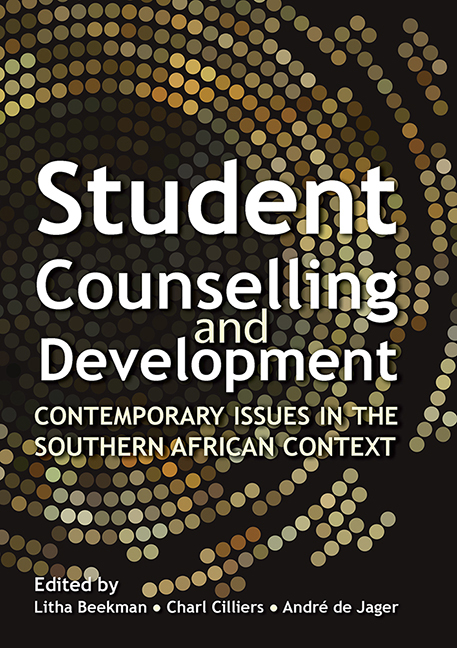 Student Counseling and Development in the South African Context
Student Counseling and Development in the South African Context Book contents
- Frontmatter
- Contents
- Figures
- Tables
- Preface
- Section 1 Development of Student Counselling and Development in Southern Africa
- Section 2 Theoretical Foundations of Student Counselling and Development in Higher Education
- Section 3 Services and Programmes Provided by Student Counselling and Development Units
- Section 4 Student Counselling and Development For Special Groups
- Section 5 Quality Assurance and Ethical and Professional Issues
- Contributors
- Index
Chapter 7 - Foundation of Counselling and Psychotherapy in Higher Education: Theories and Skills
Published online by Cambridge University Press: 22 February 2020
- Frontmatter
- Contents
- Figures
- Tables
- Preface
- Section 1 Development of Student Counselling and Development in Southern Africa
- Section 2 Theoretical Foundations of Student Counselling and Development in Higher Education
- Section 3 Services and Programmes Provided by Student Counselling and Development Units
- Section 4 Student Counselling and Development For Special Groups
- Section 5 Quality Assurance and Ethical and Professional Issues
- Contributors
- Index
Summary
INTRODUCTION
Prochaska and Norcross (2007, p. 1) describe the field of psychotherapy with an estimated 400 therapies, as “fragmented by future shock and staggered by over-choice”, a “hyperinflation of brand-name therapies”, and, an “avalanche of rival claims”. They define the features of psychotherapy theory as “a consistent perspective on human behaviour, psychopathology, and the mechanisms of therapeutic change” (ibid., p. 5). The authors contend that although an “‘absolute truth’ will probably never be attained in psychotherapy”, psychotherapists still need a theoretical framework that provides them with “tentative approximations of ‘the truth’.” Practising without a theoretical framework will leave practitioners vulnerable and directionless while being bombarded by hundreds of impressions and pieces of information in every therapeutic session. The value of psychotherapy theory is that it “describes the clinical phenomena, delimits the amount of relevant information, organizes that information, and integrates it all into a coherent body of knowledge that prioritizes our conceptualization and directs our treatment” (ibid., p. 5).
Prilleltensky and Nelson (2002, p. 21) describe psychotherapeutic theories in terms of powerful tools that have both oppressive and emancipatory effects on therapeutic interventions because “they can portray humans [students] as active or passive, altruistic, or driven to violence”. They believe that whatever theory a psychotherapist uses, “the subjects of the theory are affected by the theory itself’. Theories serve “constraining or emancipatory purposes”, and the authors believe that awareness ofthe oppressive effects of theories should be an integral part of the practice of critical psychology. Prilleltensky and Nelson's views hold much value for student counsellors within the South African and Southern African context. Western-oriented theories, which are used to counsel Africans, have constraining effects on Western-oriented practice in an African context because of what Prilleltensky and Nelson (2002, p. 21) describe as “(a) the incomplete depiction of phenomena, (b) the affixing of people to immovable moulds, and (c) the obviation of power in theory construction itself’.
If student counsellors do not use a critical psychology approach to their practice they might ignore crucial factors in explaining the higher education (HE) system influences and human behaviour of students and that will increase the “risk of affirming relations of inequality and oppression” as feared by Prilleltensky and Nelson (ibid., p. 21). Emancipatory theories, on the other hand, open up new horizons and windows of opportunity.
- Type
- Chapter
- Information
- Student Counseling and Development in the South African ContextContemporary issuesin the Southern African Context, pp. 132 - 146Publisher: University of South AfricaPrint publication year: 2012
